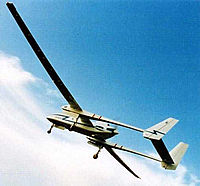The Israeli aircraft industry: a keen participant in FP5
The Israeli aircraft industry, IAI, is the one of the country's most successful industrial players in the European Commission's Fifth Framework programme (FP5). Good experiences of participation in four projects during the Fourth Framework programme encouraged the company to make continued collaboration with European partners through FP5 a corporate initiative: It appears to have paid off. Working closely with the Israeli Directorate for FP5, ISERD, and Israel's Chief Scientist of the Ministry of Industry, IAI has submitted 51 proposals to FP5. So far, 20 projects have been accepted. Of these, 12 are supported by the programme for Competitive and sustainable Growth, seven by the Information society technologies programme (IST) and one by the programme for Energy, environment and sustainable development (EESD). A further two projects are under discussion. Dr Michael Winokur, who coordinates all IAI's projects under FP5, is understandably pleased with the company's success. 'The EU Framework programme gives enormous potential for business in the future and involves a large number of small companies,' he told CORDIS News. 'All the technology is available to all the partners and we enjoy working on technological cooperation.' Of a workforce of 14500, of whom one third are engineers and academics, IAI has around 100 people working on its FP5 projects. These bring in some 200 million euro of research funds, topped up by another 15 million euro from the company's own research budget. Collaborating with them are some 157 participants from 15 other countries. The Framework programme helps to reinforce IAI's existing links with Europe. The company has customers in nearly all the EU Member States in R&D and in business. Since its establishment in 1953, IAI has built up a portfolio of expertise in both the civil and defence sectors, between which it now divides its work equally. IAI is divided into four main sections. Its commercial aircraft group, for example, produces business jets including the Galaxy, a mid-sized aircraft targeted at the American executive market. Some 50 per cent of work on the Galaxy is subcontracted to European companies, including work on the fuselage and wings and some assembly, although the planes are always finished in Israel. One third of IAI's business is carried out by its electronics group. This makes small satellite launchers for civilian satellites and large system integration civilian launchers for communications satellites including 'AMOS 1', which was produced through a joint project with Germany and France. AMOS 1 is Israel's first commercial communications satellite, which provides services over the Middle East and central Europe. The electronics group also makes radar and early warning systems for aircraft navigation. The rest of IAI's work is shared between its civilian engineering division and another specialised in military aircraft updates for fighter aircraft. 'The engineering division is heavily involved in the European Union R&D framework programmes and we see it as very advantageous,' says Arnold Nathan, who is head of IAI's R&D in the engineering division, commercial aircraft group. Their flagship project is 'TANGO', an 84 million euro project aimed to reduce both the cost and weight of airframes by 20 per cent. The consortium of 32 contractors includes Airbus industries, BAe, Aerospatiale, Dasa, Casa, ALlenia and Saab. 'We're taking state of the art technology and applying it in a technology platform,' says Nathan. 'We want to get to the point where we're able to test large pieces of structure. - building the infrastructure for the A3XX or A380.' Another area of expertise is in unmanned air vehicles 'UAVs' and IAI is currently looking to FP5 for support for projects on their civilian applications. These could include environmental monitoring, communication relay and improved telecommunications, mapping, monitoring, data collection from oceans, weather monitoring, and fire detection and management. Civilian UAVs could replace manned missions and will be cheaper, safer and more environmentally friendly, says IAI's Mark Okrent. Arnold Nathan and his colleagues are particularly keen to dispel the image that the Israeli aircraft industry is very 'American'. 'IAI has no collaborative projects with the USA,' he says. 'There are joint projects and we do have defence projects together but there is no funding from the US.' So partnership with Europe is a strategic initiative. 'We are trying to take the best possible advantage of Europe opening the gates to R&D,' he says. Dr David Harari, IAI's Deputy corp. vice president for R&D is a strong supporter of Israel's participation in the Framework programme. 'The framework speeds up a process so you can do in two months what [would otherwise] take two years. For big technology you can't just do all your research at home. With partnership we can do it quicker...We need to take advantage of competencies around Europe. Then facilities, resources and the market will come together.' Dr Harari also supports the concept of Research Commissioner Philippe Busquin's proposed 'European Research Area'. 'I believe that in 10 to 12 years they can reach an ERA and Israel can be part of it,' he tells CORDIS News. IAI has seen considerable success in recent years. Sales in 1999 rose 7.2 per cent to US$ 2 billion of which about US$ 1.5 billion was sold to 80 countries world-wide, making the company Israel's largest exporter.



